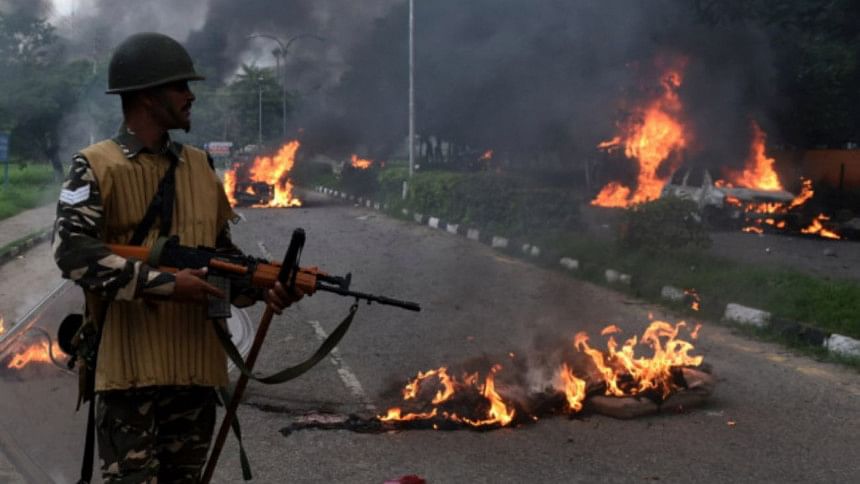The harsh truth about India's godmen

Late last month, when two Indian states and the national capital were held to ransom by rioting mobs protesting their spiritual leader's conviction on two counts of raping minor girls, many Indians found themselves confronting several painful truths about their country.
The leader who spurred these protests is Gurmeet Singh, one of the more prominent of several "godmen," or self-proclaimed spiritual leaders, who flourish across India. The flamboyant, jewellery-bedecked Singh calls himself Baba Gurmeet Ram Rahim Singh Insan—a compound of Hindu, Muslim, and Sikh names, followed by the word for "Human" in Hindi, Punjabi, and Urdu. And he has a reputation for sexually exploiting his female followers.
In 2002, two of those followers mustered the courage to press charges. In the 15 years and 200 sittings of the court it took to get to a conviction, Singh's devotees made numerous efforts to pressure investigators, police, judges, and the complainants to withdraw the case. But they did not surrender, and last month, Singh was given a 20-year prison sentence.
Singh was always a peculiar godman, eschewing spiritual asceticism for gaudy showmanship and ostentatious living. He liked his hair long, his motorcycles powerful, his cars expensive, his attire sequined, and his women clingy. He performed in popular music videos of his own composition—his biggest hit is called "Love Charger"—and had a feature film made about himself called MSG: The Messenger of God.
It is estimated that this unlikely "Rockstar Baba" attracted tens of millions of fanatical worshippers to his Dera Sacha Sauda movement. And with the help of his henchmen, he kept the flock together in ruthlessly effective ways. Most notably, a crusading small-town journalist who reported the rape complaint against him was murdered in 2002.
Over the years, Dera Sacha Sauda amassed a significant land bank and real-estate assets, and enjoyed considerable influence in the states of Punjab and Haryana, with its reach extending to Delhi. It also fulfilled a fundamental need in Northern Indian society: to give millions an identity, a standing in society, and a sense of security that they and their families had not previously known.
Dera members are overwhelmingly Sikhs. A key message of Sikhism—equality among the faithful—has in the past inspired people from the lower Hindu castes to convert. But so deep is the prejudice in Indian society that many converted Sikhs found that their new co-religionists of higher castes, who dominate the faith's official religious bodies, treated them no better than Hindus had.
Faced with an entrenched status quo, many Sikhs of less privileged backgrounds became disillusioned. Their feelings of anger and helplessness, compounded by poor education and soaring unemployment, often drove them toward alcohol and drugs.
For these desperate people, the Dera Sacha Sauda and its charismatic leader—not to mention the several other, mostly smaller Deras dotting Punjab and Haryana—emerged as saviours. The Dera offered free education to its members and their children and free food for the hungry. It kept the faithful off drugs, and provided employment in its enterprises, offering not only a livelihood, but also a sense of meaning and purpose. It thus delivered to its followers that most precious and intangible of human needs: a sense of worth and belonging.
Politicians played along with the Deras, which helped to maintain social peace, tamp down discontent, and channel frustrations toward constructive activity. The Deras helped reduce addiction, replaced anomie with community, and redirected despair to divinity. So, rather than repudiate them as dangerous cults, successive governments rushed to embrace them.
The loyalty the Deras inspire among their members should not be underestimated. There is, of course, the religious fervour that accompanies affiliation with a spiritual guru. But at the heart of a Dera's appeal is social and economic security, the ability to fulfil people's basic needs. In Singh's case, where government and civil society failed, an apparent charlatan succeeded.
That success mattered far more than Singh's flaws. People who were willing to lend their wives and daughters to their guru, for the sake of the security he offered, could not understand why the same "blessing," extended to the two girls, should land him in jail. As a commenter put it on Facebook, "A lost man doesn't care if a rapist gives him direction. A hungry man will take food from a murderer's hand."
The resistance by Dera followers to their guru's conviction exposed their fears that without him and his organisation, they might once again face social and economic marginalisation. They identify intensely with him, whatever he does. They are willing to kill for him, because, as they might see it, they would really be killing for themselves.
That commitment was apparent in the rioting and destruction that followed Singh's conviction, in which 30 people were killed, dozens of vehicles burned, several buildings (including two new hotels) set ablaze, train carriages wrecked, and roads blocked, paralysing life across an important swath of northern India for several days.
Many Indians lament that such blind religious devotion should thrive in their country in the second decade of the twenty-first century. But the violence raises far more troubling questions than that.
The episode shows that India's much-touted economic development has shallow roots, as it has failed to deliver caste equality and social justice to the under-classes. It shows that official institutions of governance will all too readily delegate their responsibilities, enabling those who run religious orders to live above the law. It shows the fragility of law enforcement, which failed so spectacularly in the face of mass fury. And it shows the hold of charismatic leaders over vast numbers of people who find validation and purpose in unthinking obeisance.
Baba Gurmeet Ram Rahim Singh Insan was flown to prison in a luxurious helicopter with an "adopted daughter" in devoted attendance; he nibbled abstractedly at a piece of chocolate as a police escort carried his bags. The Baba may be in jail—but Indian society is still in the dock.
Shashi Tharoor, a former UN under-secretary-general and former Indian Minister of State for External Affairs and Minister of State for Human Resource Development, is currently Chairman of the Parliamentary Standing Committee on External Affairs and an MP for the Indian National Congress.
Copyright: Project Syndicate, 2017.
www.project-syndicate.org
(Exclusive to The Daily Star)





Comments